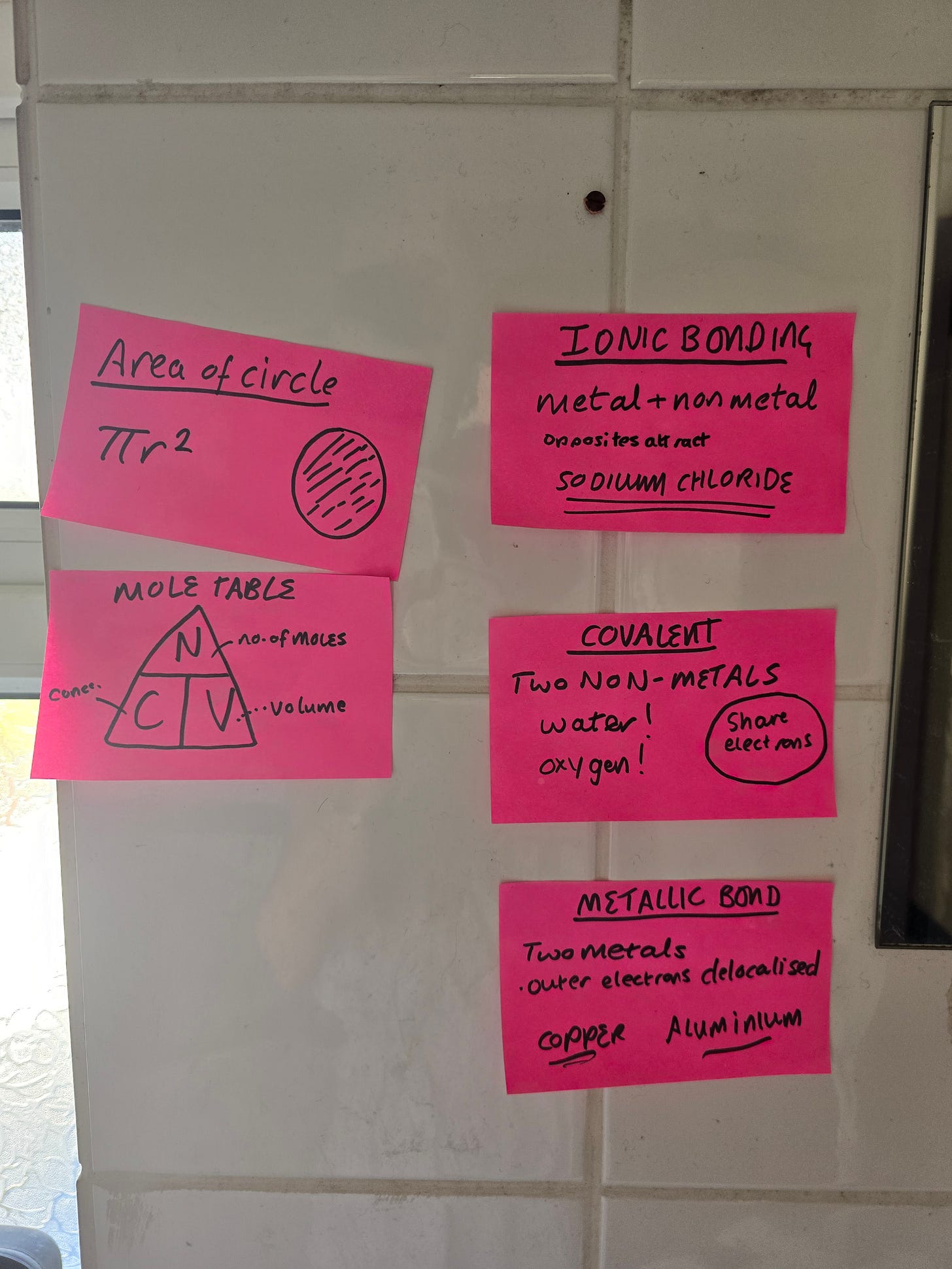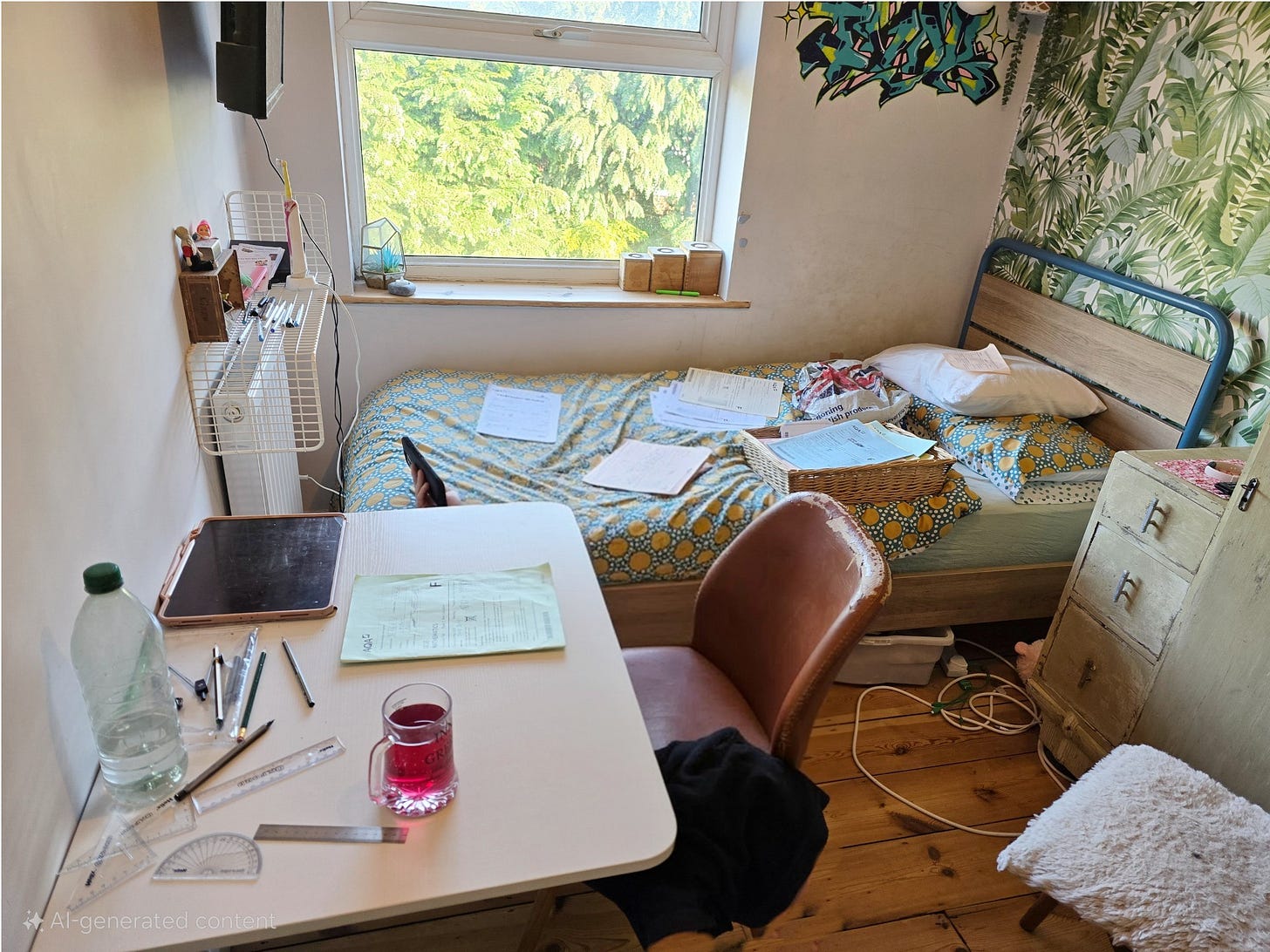Measuring heat capacity, root hairs, Macbeth’s psychological torment, simultaneous equations, Scrooge’s avaricious nature, King James’s Daemonologie, chlorophyll, the killing of witches, straight line graphs, ionic bonds, kinetic energy, the digestive system, quadrats...
If you’re a parent to a neurodivergent child going through GCSEs right now, then you might well know what I’m talking about.
If my child’s learning it, I’m learning it.
I remember reading that the best way for an ADHDer to learn is to teach others — so I am learning a whole lot!
Life in the Tunnel
We’re halfway through the GCSE exam tunnel.
My eldest is an AuDHDer, and it's been quite a journey to get to this point. A few years ago, I wasn’t even sure they’d manage secondary school. We had to change schools early on because they weren’t coping in the first one, but with a solid new set of friends, an ADHD diagnosis and medication, they began to find their feet.
Throughout their school years, it was hard. I’m not sure how much they could actually take in during lessons, and I made a decision early on not to push homework. They often came home completely wiped out. So we kept it minimal — mainly just maths, and only when they were up for it.
We also made sure they picked creative, non-exam-heavy subjects they genuinely enjoyed — ones where coursework could showcase their strengths. I helped where I could.
But then came the run-up to mocks — and reality hit.
Locked In
My child was being exposed to the GCSE pressure-cooker at school daily:
“You’ll never get a job if you don’t pass.”
“These are the most important exams of your life.”
I tried to counter it with:
“All I want is for you to have a good social life and emotional health. GCSEs aren’t everything.”
But they said:
“Mum, it doesn’t matter what you say — I’m in that school every day. You can’t fight it.”
When they told me they were “locked in” to revise, I took a deep breath.
There’s a phrase I use in my work: holding the both-and. Here, I knew I had to hold both — that this system isn’t made for ND brains — and that I needed to follow my child’s lead in wanting to work with it anyway.
Since then, I’ve body doubled with them almost daily — revising together, doing maths together, sitting side-by-side through homework. We crammed in learning the days and evenings before mocks, and they got their first real taste of what GCSEs in exam conditions would feel like.
The November mocks were key. After Christmas, something shifted. They began really tuning in. I noticed they were writing down everything the teachers said. Books filled up with page after page. I could see how hard they were trying.
The Other Half of the Story
Getting to this point has taken years — and it’s the story of so many families across the country right now.
But it’s only half the story.
Because many, many neurodivergent children don’t get this far in the mainstream system. And in our house, that’s our reality too.
I myself am split in two halves as a parent — I have one ND child in mainstream, hell-bent on getting his GCSEs, and I have another ND child at home, hell-bent on never going back to school ever again. And I support them both. I respect and follow their lead. In all of this, I educate both of them on how the education system is utterly failing neurodivergent children — that there are systemic failures at every level. I want them to know that the problem isn’t in them, it’s in the system itself: underfunded, inflexible, inaccessible. I want them to know their struggles are not personal failures.
Children Without the Appropriate Support
Here’s what breaks my heart even more:
There are kids like mine who have a diagnosis — but still don’t get access to medication. Long waiting lists. Postcode lotteries. Systemic fear. They’re doing all this without the scaffolding that might make it even slightly more manageable.
There are children sitting GCSEs right now who don’t even know they’re neurodivergent. Their undiagnosed ADHD or autism is showing up as “lazy,” “defiant,” “underachieving.” They internalise those words and carry them into adulthood. Some mask too well and go unnoticed. Others give up altogether.
And then… there’s the generation of adults who went through their own GCSEs without even the language to explain what was happening.
No body doubling.
No extra time.
No medication.
No one saying: “Your struggles aren’t your fault.”
Just silent overwhelm. And shame.
So many neurodivergent adults I work with now remember that time with deep grief.
The playing field was never level. We just didn’t know it.
So What Helped?
What helped us work the system as best we could?
ADHD medication in the run-up to exams — this made a huge difference.
I body doubled with them most evenings. Managing energy and the nervous system was key.
We experimented with different learning methods — AI tools, short videos (no music!), physical flashcards. Gradually, they built the ability to revise on their own.
On exam days, we were up at 6am, cramming until the last possible minute.
I drove them to school each time, so co-regulation could continue right up to the door.
I fought hard for them to receive extra time in exams.
They had a handful of teachers who truly saw them — who believed in them and built real, human connections.
Even With All That...
Even with all that support, it hasn’t been plain sailing.
After one maths exam that went especially well, my child came home excited — until we decided to look up the answer to one question, which they got wrong. That triggered a spiral and a shutdown that lasted for hours.
It was like falling into another dimension — black-and-white thinking, the lost positive energy followed by despair.
And the scariest part?
Knowing that if they couldn’t pull themselves out, it could derail the next exam the very next day.
We talked.
We sat together.
Somehow, they found their way back.
That moment — the strength it took, the insight, the way they clawed themselves out — will stay with me longer than any grade on a piece of paper ever could.
(If you’re autistic and you’re reading this, I think you’ll know exactly what I mean.)
If You’re Walking This Road Too
So many invisible victories.
So many unseen battles.
If you’re a parent walking this same road — if your child is crawling through this tunnel, or refusing to enter it at all — I see you.
If you’re an adult who went through this without the tools, the understanding, or the words — I see you too.
You didn’t fail.
You were failed.
And now we know better, we do better.
Let’s keep telling the truth about what this system asks —
and what it refuses to give.






